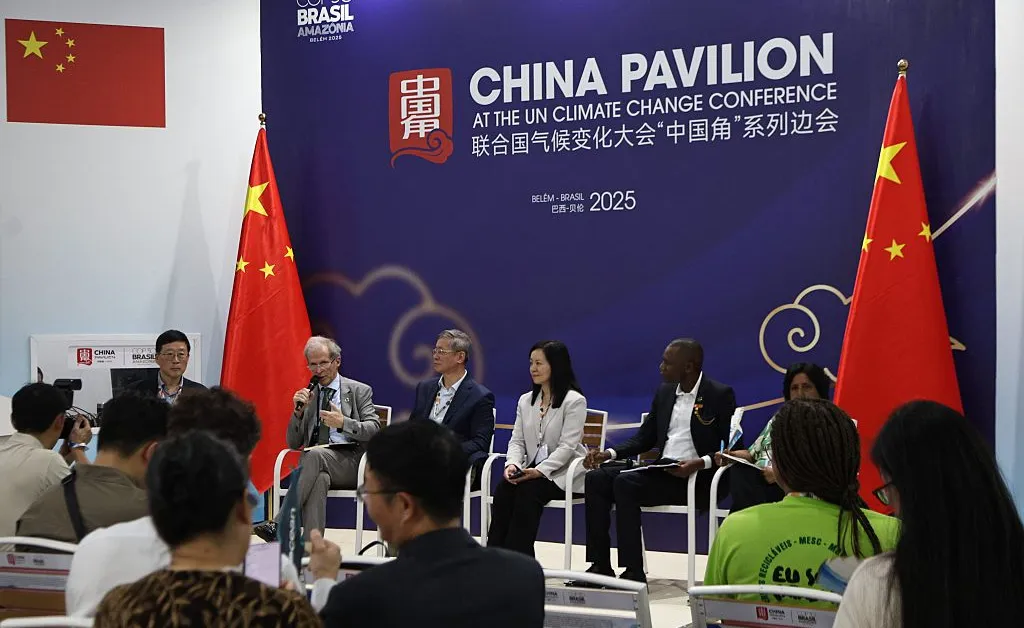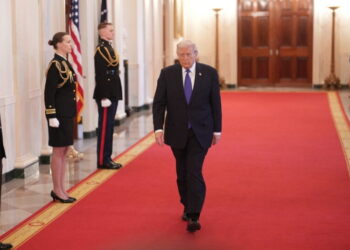When the annual UN climate negotiations (COP30) opened in Belém, a new balance of power was visible. China arrived with 789 delegates; Nigeria with 749; Saudi Arabia with 127; the UAE with 94. For the first time in COP history, the official U.S. delegation was zero.
At the center of the conference venue, the largest pavilions belong to China, Saudi Arabia, Azerbaijan, and India—glossy showcases of climate technologies and national narratives. Two years ago at COP28, the U.S. pavilion buzzed with events featuring the vice president, cabinet officials, and nearly 20 members of Congress. Now, there is no U.S. pavilion.
[time-brightcove not-tgx=”true”]
By choosing not to show up, the United States is ceding climate leadership to those who did: a group of fundamentally illiberal powers, many of them authoritarian or tightly controlled petro-states. Whether intentionally or not, the world is now wagering that these regimes will manage the climate future more effectively than liberal democracies have over the past decades.
Even Gov. Gavin Newsom’s brief stop to declare California “open for climate business” and the appearance of several U.S. congresspeople—like climate champion Sen. Sheldon Whitehouse—only underscored Washington’s official absence.
The United States has never been a perfect climate actor, but at key moments it has been a necessary broker: rescuing Copenhagen, forging the 2014 U.S.-China agreement that paved the way for Paris, and backing the fossil-fuel “phase-down” language at COP28. Imperfect as those efforts were, they stitched together bargains across blocs.
Inside the negotiating rooms, that absence is unmistakable. The U.S. is allowing others to shape the hardest fights at COP30: the integrity of the global stocktake, metrics to gauge climate adaptation, rules for carbon markets, and the roadmap to achieve $1.3 trillion per year in public climate finance by 2035.
The European Union and small island states are pushing, but without U.S. weight behind them, the question hanging over Belém is whether the UNFCCC can deliver a plausible 1.5-2°C pathway and meet the adaptation and finance needs of developing countries.
Read more: The Future of Climate Progress Is Being Built in the Global South
As confidence in that promise erodes, wealthy, authoritarian states step forward as an alternative center of gravity—offering not just different politics of climate leadership but potentially the money, technology, and governance models to implement it.
Treating these regimes as the new engines of climate action amounts to a collective gamble: a bet that their capital-backed governance will deliver climate progress that democracies have failed to muster.
On the surface, it isn’t irrational. Centralized systems can turn top-down directives into rapid, large-scale build-out. China’s emissions have been flat or falling for 18 months, driven by record deployment of solar, wind, and electric vehicles. In 2023 alone, China installed roughly 217 gigawatts of new solar capacity, compared with just 32 gigawatts in the United States. Saudi Arabia has committed $8.4 billion to a flagship green hydrogen project, and another $8.3 billion to new solar and wind farms. In this light, illiberal governance offers advantages in the race to decarbonize.
Seen from Belém, the appeal of this model doesn’t stop at home. For many developing countries, the draw is not its politics but its capital: a more credible offer of large-scale climate finance than the pledges they have long heard—but rarely seen delivered—from Western democracies.
Beijing is exporting clean-energy infrastructure across the Global South through the Belt and Road Initiative, which has already directed tens of billions of dollars in climate-related finance—more than $34 billion since 2013. Saudi Arabia and the UAE have sovereign wealth funds with trillions of dollars in state-controlled capital—the kind of money developing countries have been told for years would come from Western democracies.
Read more: Adaptation Is Climate Leadership
Yet the very features that make this model attractive also make it dangerous; they turn it into a perilous bet for the world’s climate future. Illiberal efficiency often masks deep fragility and capture. These regimes can move quickly, but they can also reverse course when political imperatives shift or fossil-fuel interests assert control. In many of them, those interests are the regime: state-owned oil and gas companies, coal provinces, and national champions whose revenues anchor political survival.
Climate decisions are hammered out not through electoral outcomes or parliamentary debates but in opaque bargains among party officials, security services, and hydrocarbon elites. The same centralized structures that accelerate deployment also weaponize climate finance as geopolitical leverage rather than global need. And even when these systems deliver speed, they do so by sidelining rights, silencing dissent, and normalizing a model of climate governance fundamentally at odds with the values democracies claim to defend.
By not showing up in Belém, the United States has walked away from the table and left the world to gamble that illiberal, petro-backed regimes will deliver the climate future democracies have not—a gamble that is as dangerous for democracy as it is for the planet.
The post The U.S. Is Ceding Climate Leadership to Authoritarian States appeared first on TIME.




